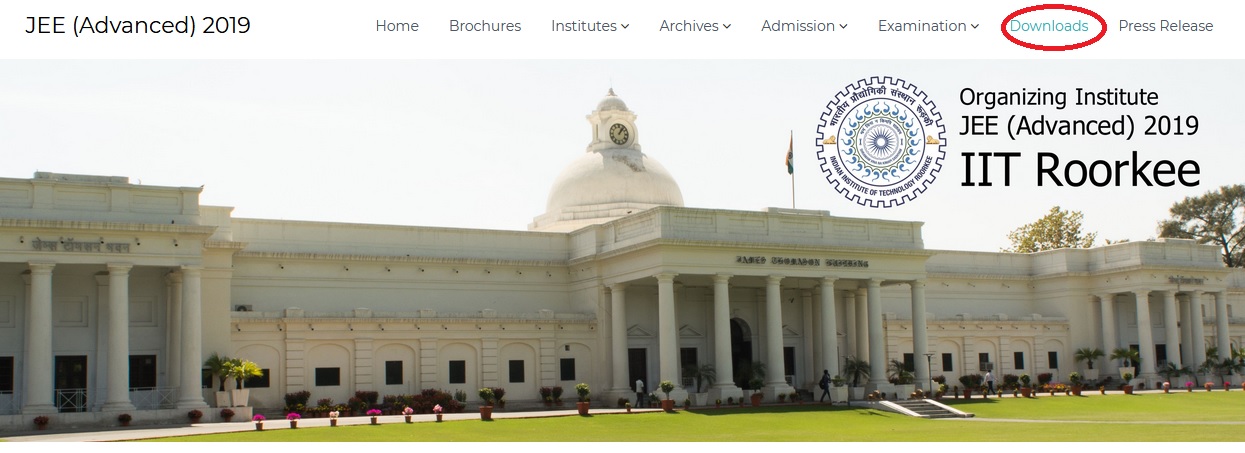JEE Advanced Past Question Papers : jeeadv.iitd.ac.in Indian Institutes of Technology
Name of the Institute : Indian Institutes of Technology
Name of the Examination : JEE (Advanced)
Subject : Physics/ Chemistry/ Mathematics
Website : jeeadv.iitd.ac.in
Document Type : Past Question Papers
Downloads :
2014 :
Paper 1 : https://www.pdfquestion.in/uploads/84-2014p1key_0.pdf
Paper 2 : https://www.pdfquestion.in/uploads/84-2014p2key.pdf
2013 :
Paper 1 : https://www.pdfquestion.in/uploads/84-2013p1.pdf
Paper 2 : https://www.pdfquestion.in/uploads/84-2013p2.pdf
2012 :
Paper 1 : https://www.pdfquestion.in/uploads/84-2012p1.pdf
Paper 2 : https://www.pdfquestion.in/uploads/84-2012p2.pdf
2011 :
Paper 1 : https://www.pdfquestion.in/uploads/84-2011p1.pdf
Paper 2 : https://www.pdfquestion.in/uploads/84-2011p2.pdf
2010 :
Paper 1 : https://www.pdfquestion.in/uploads/84-2010p1.pdf
Paper 2 : https://www.pdfquestion.in/uploads/84-2009p2.pdf
2009 :
Paper 1 : https://www.pdfquestion.in/uploads/84-2009p1.pdf
Paper 2 : https://www.pdfquestion.in/uploads/84-2009p2.pdf
2008 :
Paper 1 : https://www.pdfquestion.in/uploads/84-2008p1.pdf
Paper 2 : https://www.pdfquestion.in/uploads/84-2008p2.pdf
2007 :
Paper 1 : https://www.pdfquestion.in/uploads/84-2007p1.pdf
Paper 2 : https://www.pdfquestion.in/uploads/84-2007p2.pdf
JEE Advanced Past Question Papers
2013 – Paper1- Physics :
This section contains 10 multiple choice questions. Each question has four choices (A), (B), (C) and (D) out of which ONLY ONE is correct.
Related : Indian Institutes of Technology JEE Advanced Past Question Paper : www.pdfquestion.in/84.html
Section – I
Question: 1
The diameter of a cylinder is measured using a Vernier callipers with no zero error. it is found that the zero of the Vernier scale lies between 5.10 cm and 5.15 cm of the main scale. The Vernier scale has 50 divisions equivalent to 2.45 cm. The 24th division of the Vernier scale exactly coincides with one of the main scale divisions.
The diameter of the cylinder is
(A) 5.112 cm
(B) 5124 cm
(C) 5.136 cm
(D) 5.148 cm
Answer : B

Question: 2
2. Two non-reactive monoatomic ideal gases have their atomic masses in the ratio 2 : 3. The ratio of their partial pressures, when enclosed in a vessel kept at a constant temperature, is 4 : 3. The ratio of their densities is
(A) 1 :4
(B) 1 :2
(C) 6 :9
(D) 819
Answer : D
Question: 3
Two rectangular blocks, having identical dimensions, can be arranged either in configuration I or in configuration H as shown in the figure. One of the blocks has thermal conductivity K and the other 2K. The temperature difference between theends along the x-axis is the same in both the configurations. lt takes 9 s to transport a certain amount of heat .from the hot end to the cold end in the configuration I. The time to transport the same amount of heat in the configuration II is
(A) 2.0 s
(B) 3.0 S
(C) 4.5 s
(D) 6.0 s
Answer : A
Question: 4
One end of a horizontal thick copper wire of length 2L and radius 2R is welded to an end of another horizontal thin copper wire of length L and radius R. When the arrangement is stretched by applying forces at two ends, the ratio of the elongation in the thin wire to that in the thick wire is
(A) 0.25
(B) 0.50
(C) 2.00
(D) 4.00
Answer : C
Question: 5
The image of an object, formed by a piano-convex lens at a distance of 8 m behind the lens, is real and is one-third the size of the object. The wavelength of light inside the lens is 2/3 times the wavelength in free space. The radius of the curved surface
(A) 1m
(B) 2m
(C) 3m
(D) 6m
Answer : C
Section – II
** This section contains EIGHT questions.
** Each question has FOUR options (A), (B), (C) and (D). ONE OR MORE THAN ONE of these four option(s) is(are) correct.
** For each question, darken the bubble(s) corresponding to all the correct option(s) in the ORS.
For each question, marks will be awarded in one of the following categories:
Full Marks : +4 If only the bubble(s) corresponding to all the correct option(s) is(are) darkened.
Partial Marks : +1 For darkening a bubble corresponding to each correct option,provided NO incorrect option is darkened.
Zero Marks : 0 If none of the bubbles is darkened.
Negative Marks : —2. In all other cases.
For example, if (A), (C) and (D) are all the correct options for a question, darkening all these three will result in +4 marks; darkening only (A) and (D) will result in +2 marks; and darkening (A) and (B) will result in-2 marks, as a wrong option is also darkened
Q.5 Highly excited states for hydrogen-like atoms (also called Rydberg states) with nuclear charge Ze are defined by their principal quantum number n, where n >1. Which of the following statement(s) is(are) true?
(A) Relative change in the radii of two consecutive orbitals does not depend on Z
(B) Relative change in the radii of two consecutive orbitals varies as 1/n
(C) Relative change in the energy of two consecutive orbitals varies as 1/n.”
(D) Relative change in the angular momenta of two consecutive orbitals varies as 1/n
Q.7. Two loudspeakers M and N are located 20 m apart and emit sound at frequencies 118 Hz and 121 Hz, respectively. A car is initially at a point P, 1800 m away from the Inidpoint Q of the line MN and moves towards Q constantly at 60 km/hr along the perpendicular bisector of MN. It crosses Q and eventually reaches a point R, 1800 m away from Q. Let v(t) represent the beat frequency measured by a person sitting in the car at time t. Let ve., vo and v, be the beat frequencies measured at locations P, Q and R, respectively. The speed of sound in air is 330 m sº. Which of the following statement(s) is(are) true regarding the sound heard by the person?
(A) vet Vn = 2 vo
(B) The rate of change in beat frequency is maximum when the car passes through Q
(C) The plot below represents schematically the variation of beat frequency with time
(D) The plot below represents schematically the variation of beat frequency with time